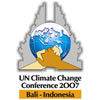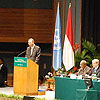Japan pledges $2b for climate change fight
Abdul Khalik and Kornelius Purba, The Jakarta Post, Singapore
Japan announced Wednesday it would provide US$2 billion to support efforts to overcome climate change and pollution in Asia, ahead of world talks in Bali in December.
The promise was welcomed by representatives of developing nations, as 16 leaders attending the East Asian Summit (EAS) signed an environmental pact in Singapore.
The declaration promises joint action on climate change and forest cover and promotes nuclear energy.
Japan's prime minister Yasuo Fukuda said his country's funds would support efforts toward sustainable development through the balancing of economic growth and harmful emissions.
"Japan will ... (also) conduct capacity building for some 500 trainees in the next five years for the promotion of measures against air, water and other pollution," Fukuda said in a press conference.
Foreign Minister Hassan Wirayuda said he welcomed Japan's plan, saying the "very positive initiative" would boost the region's ability to handle environmental problems and the impacts of climate change.
"It shows that big countries in the region, especially Japan, have taken seriously environmental issues and climate change -- and have shown intentions to take concrete action," he later told The Jakarta Post.
Indonesia joined other Asian leaders to sign the "Declaration on Energy, Climate Change and the Environment", which also addresses energy security.
The leaders together committed to work harder to develop alternative energy sources and cleaner fossil-fuel technologies as well as to improve energy efficiency and conservation.
The leaders in the declaration said atomic energy would be used in a "manner ensuring nuclear safety, security and non-proliferation".
Leaders from Southeast Asia were joined in Singapore by presidents, prime ministers and foreign ministers from China, Japan, South Korea, India, New Zealand and Australia.
The declaration read: "All countries should play a role in addressing the common challenge of climate change, depending on their ability and different responsibilities".
Hassan said the declaration indicated a "similar understanding" among all the Asian countries, ahead of the 13th Conference of Parties at the United Nations Framework Convention on Climate Change to be held Dec. 3-14 in Bali.
In October, the Asia Pacific Economic Cooperation forum in Sydney, Australia, promoted its idea of overcoming climate change voluntarily -- as opposed to commitments agreed to in the Kyoto Protocol.
Australia and the United States have not signed Kyoto, citing fears the obligation to bring down emissions to their 2005 levels would be economically harmful.
In his opening remarks, Singapore Prime Minister Lee Hsien Loong said the Singapore declaration would "provide impetus for the UNFCCC meeting in Bali next month".
The declaration however included no fixed targets on cutting or limiting emissions by a specific date, after objections from less-developed Asian countries.
"Climate change has to be addressed -- but they cannot leave people in absolute poverty," Prime Minister Lee told Reuters.
Rafael Senga, the Asia-Pacific energy coordinator for the World Wildlife Fund, criticized the regional pact, calling it "empty rhetoric", AFP reported.
But he said Japan's "very timely offer will help countries like China and India achieve the targets they have set and implement the laws that they have enacted".






No comments:
Post a Comment